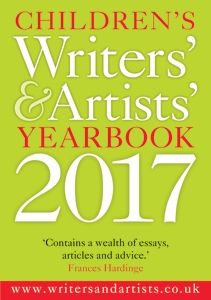Some of the most topical issues in UK Publishing at the moment are only tangentially to do with books and readers; rather more tied up with post-Brexit discussions over inequality in the industry. Notably, there's a lack of BAME publishing talent: a legitimate gripe and a long-standing issue. And then there's the supposed lack of northern (and for that read ‘working-class’) creative talent. I might take exception to that if I was a novelist, poet, illustrator or screenwriter housed north, or indeed east or west, of Watford Gap!

As Editor of the Writers' & Artists' Yearbooks, I don't commission pieces because of where authors live; I invite contributions from the very best writers because I think they have something to say about their experience as a writer. Collectively they present a whole cast of characters in all their glorious variety. Good to know, then, that there ARE writers thriving tens and hundreds of miles outside London.
Open the pages of the Children's Writers' & Artists' Yearbook – and you’ll meet a gaggle of non-southerners. New this year is Tom Palmer, Halifax-based, who writes about partnering with non-traditional organisations to bring stories to a wider readership: in his case to fans of football, rugby and planes. The Yearbook includes articles packed with advice from heavyweights David Almond, long-time resident of the northeast, Anne Fine, who lives in County Durham, and Merseyside-based authors Frank Cottrell Boyce and Jon Mayhew. Eoin Colfer lives in Ireland, illustrator Tony Ross hails from Wales, and although not north, but definitely not London, Michael Morpurgo writes in the southwest, another economically deprived part of the country.
We profile the work of northern-based organisations dedicated to the promotion of children’s books: Seven Stories – The National Centre for Children’s Books, who are based in Newcastle upon Tyne, and SCBWI – The Society of Children’s Book Writers and Illustrators, who have members and chapters all over the British Isles and far beyond too. And let’s not forget our most northerly of outposts: Scotland, which boasts an amazingly rich cultural landscape and has a disproportionately large number of writers for both children and adults when compared to its population size. Scotland-based J. K. Rowling, Debi Gliori, Linda Strachan, who writes for the Yearbook on ‘Children’s writing in the digital age’, Janey Louise Jones, and copyright expert Gillian Haggart Davies are all have residency in the Children's Writers' & Artists' Yearbook 2017.
And all of the examples above are just for starters. There really IS so much diversity and richness to celebrate all around us, wherever we bibliophiles happen to reside. It's true that issues remain around the economics of writing, and it's important we strive to get them addressed as it's so undeniably enriching - in every sense of that term - to have as many different voices as possible finding their way into the hands of all readers of all ages. Location, educational or economic background should not prevent stories being heard.
So, no matter where you are are, if you're a writer and/or illustrator just starting out, I invite you to take a look at the candid advice the latest editions of the Writers' & Artists' Yearbook and Children's Writers' & Artists' Yearbook.
In the end, I think talent will out. But to deny there is a North South divide in writing as in most everything else is possibly a little naïve. People who usually say there are no divides are often those who are privileged and actually benefit from those divides. Not in every case obviously, but there it is. And then we can come to the actual funding. When recently we found out that London got 90% of arts funding in the UK, there was understandably a massive outcry. Deep down, I suspect few were really surprised though. Does that funding go to black, white working class or ethnic minorities in London? I suspect large chunks of it go to the affluent and white middle class. But, then, what's new?
I really don't agree- educational background, economic status and location play an enormous factor in getting published. London is still the power house of publishing. Of course there is huge talent in the North but who gets published in the main? Remember the North has a middle class/working class divide. The latter can barely get a foot in the door.